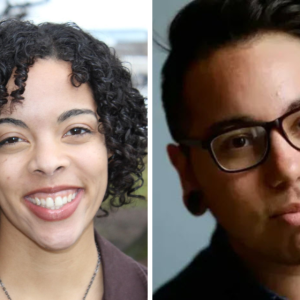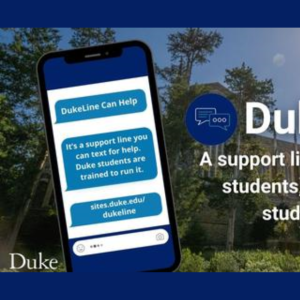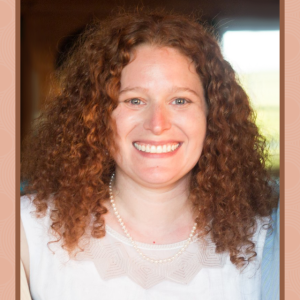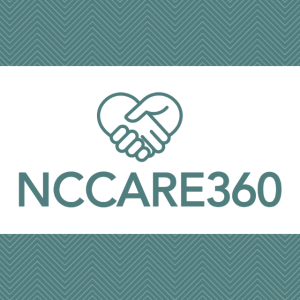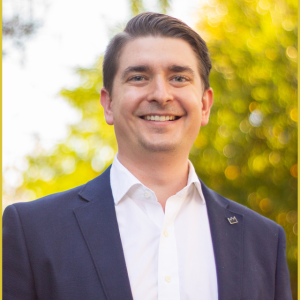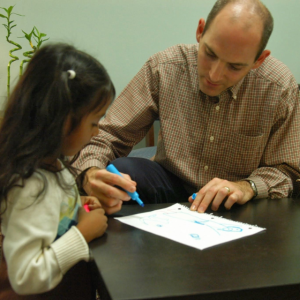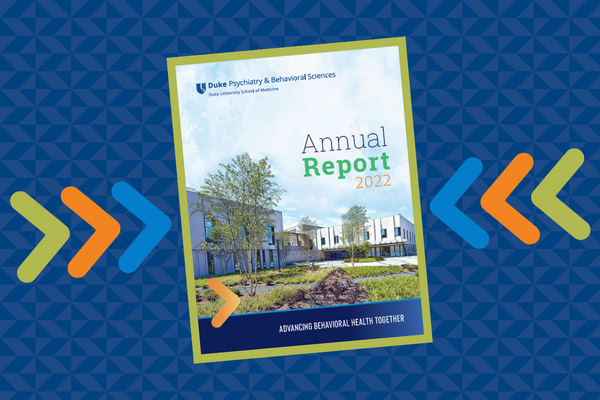
Advancing Behavioral Health Together
Our 2022 annual report features highlights from our clinical, education and research missions; equity, diversity and inclusion initiatives; advocacy and media engagement; philanthropic efforts; and much more!
Read Select Articles from the Report:
Supporting Mental Health in Patients with High-Risk Pregnancies
When Bernadette Vereen, MSW, LCSW-A, was hired as a member of Duke Psychiatry & Behavioral Sciences’ growing perinatal mental health team in fall 2021, she quickly connected with Julia Tarr, MSW, LCSW, who had recently begun her role serving three Duke Perinatal high-risk obstetrics clinics. Within a few months, the two social workers were talking daily, collaborating to figure out how to best provide behavioral health support to patients with high-risk pregnancies.
Partnering with the Community to Reverse the HIV Trend in Latinx Individuals
Through a new National Institutes of Health grant, Sarah “Sadie” Wilson, PhD, hopes to reduce inequities that place Latinx individuals at higher risk of HIV. She’s partnering with her friend and colleague, Joaquin Carcaño, director of southern health policy at Latinos in the South, to launch a community-based, equity-focused initiative in the Charlotte, North Carolina area.
Students Support Each Other’s Mental Health, One Text at a Time
Undergraduate students who are feeling stressed can get immediate support every night via DukeLine, an anonymous texting platform that connects them with trained peers. Duke Psychiatry's Nancy Zucker, PhD, founded and leads the support service.
Duke Student Inspires Peer Support Program for Young Cancer Patients
Duke student Bobby Menges' vision became his legacy after he passed away from cancer in 2017. His family started the I’m Not Done Yet Foundation, which focuses on supporting teen and young adult patients with cancer and other serious, chronic, and long-term illnesses as they transition from pediatric to adult care. With the foundation’s generous support, Duke Psychiatry established Bobby’s Coaches, a peer support program that pairs young adult cancer survivors with younger mentees.
Collaborative Peer Coaching Helps Support Neurosurgery Residents
Through a novel peer coaching initiative, Duke neurosurgery residents have an outlet to process their experiences in residency and learn strategies to help them cope with the challenges of graduate medical training. The initiative also gives clinical psychology doctoral interns in Duke Psychiatry & Behavioral Sciences an opportunity to hone their skills in coaching, building connections with peer trainees, and facilitating small groups.
“Jodie’s Prom” Honors Duke Psychiatry Social Worker’s Legacy
Jodie Neukirch Elliott, who was born with a heart condition, was passionate about helping adolescents and young adults with chronic medical conditions; nowhere was this more evident than in her tireless work to create magical virtual Children's Prom experiences during the pandemic. She passed away on August 3, 2022, from complications related to a heart transplant. In honor of her creativity and dedication to making the annual event as special as possible for participants, the Duke Children’s Prom will be renamed “Jodie’s Prom.”
NCCARE360 Helps North Carolinians Address their Non-Medical Social Needs
Duke Health is among the health systems across the state that are using the NCCARE360 platform to better serve their patients. Susan Spratt, MD, associate professor of medicine, is leading the implementation at Duke, and Elena Tenenbaum, PhD, assistant professor in psychiatry and behavioral sciences, is spearheading the behavioral health facets of Duke’s efforts.
Child & Adolescent Psychiatry Fellows Meet Children Where They Are: In Schools
For second-year child and adolescent psychiatry fellow Aishwarya Rajagopalan, DO, MHS, the fellowship’s school consultation rotation is a golden opportunity “to engage with a system that plays a really big role in the outcome of the care we deliver and to see what happens ‘on the other side,’ outside of our clinic,” which she says can sometimes feel like a vacuum.
Fifth-Year Med-Psych Resident Cameron Strong Reflects on His Journey
Cameron Strong’s advice to prospective and current trainees, regardless of their specialty, is to keep an open mind. He believes taking advantage of a variety of opportunities, even if they don’t seem directly related to their future plans, can help trainees grow as people and as clinicians. It’s an approach he takes to heart, and if he hadn’t followed his own counsel, today he’d be performing endoscopies instead of psychiatric evaluations.
Partnership Aims to Enhance ADHD Treatment for Latinx Children
Latinx children are disproportionately impacted by mental health care inequities, including for ADHD. To help address this issue locally, a team of ADHD researchers and clinicians from Duke Psychiatry is partnering with staff from El Futuro—a non-profit outpatient clinic that provides comprehensive mental health services for Latinx families—to develop a culturally-adapted approach that enhances existing ADHD treatment for Latinx families in the Durham community.

